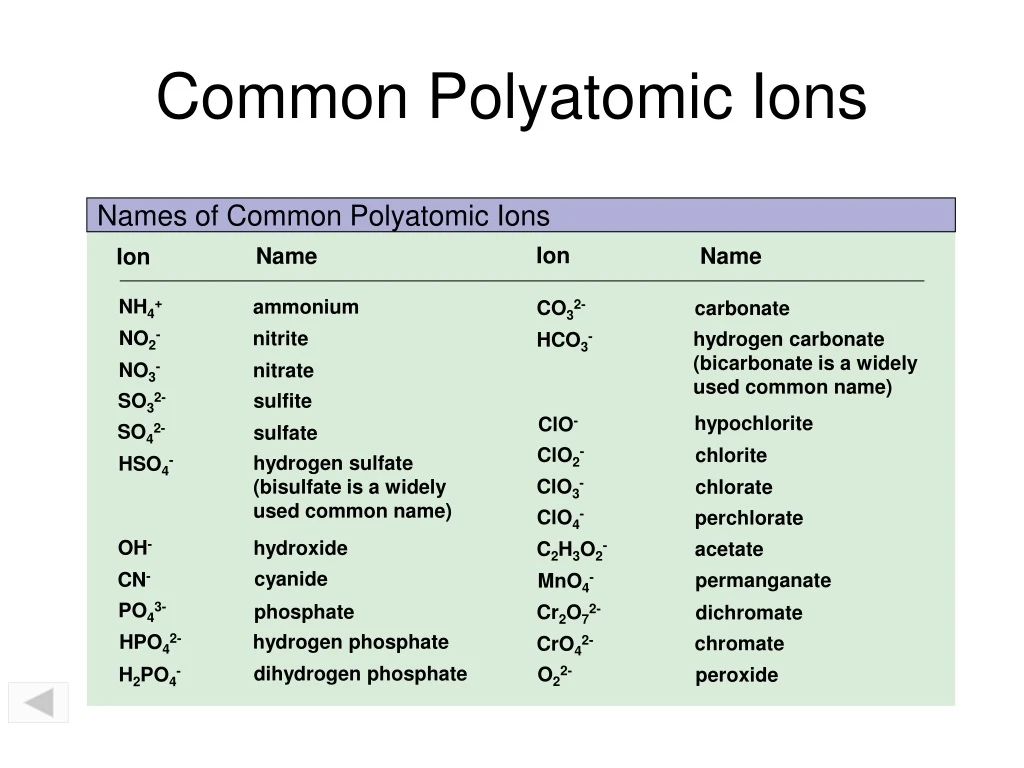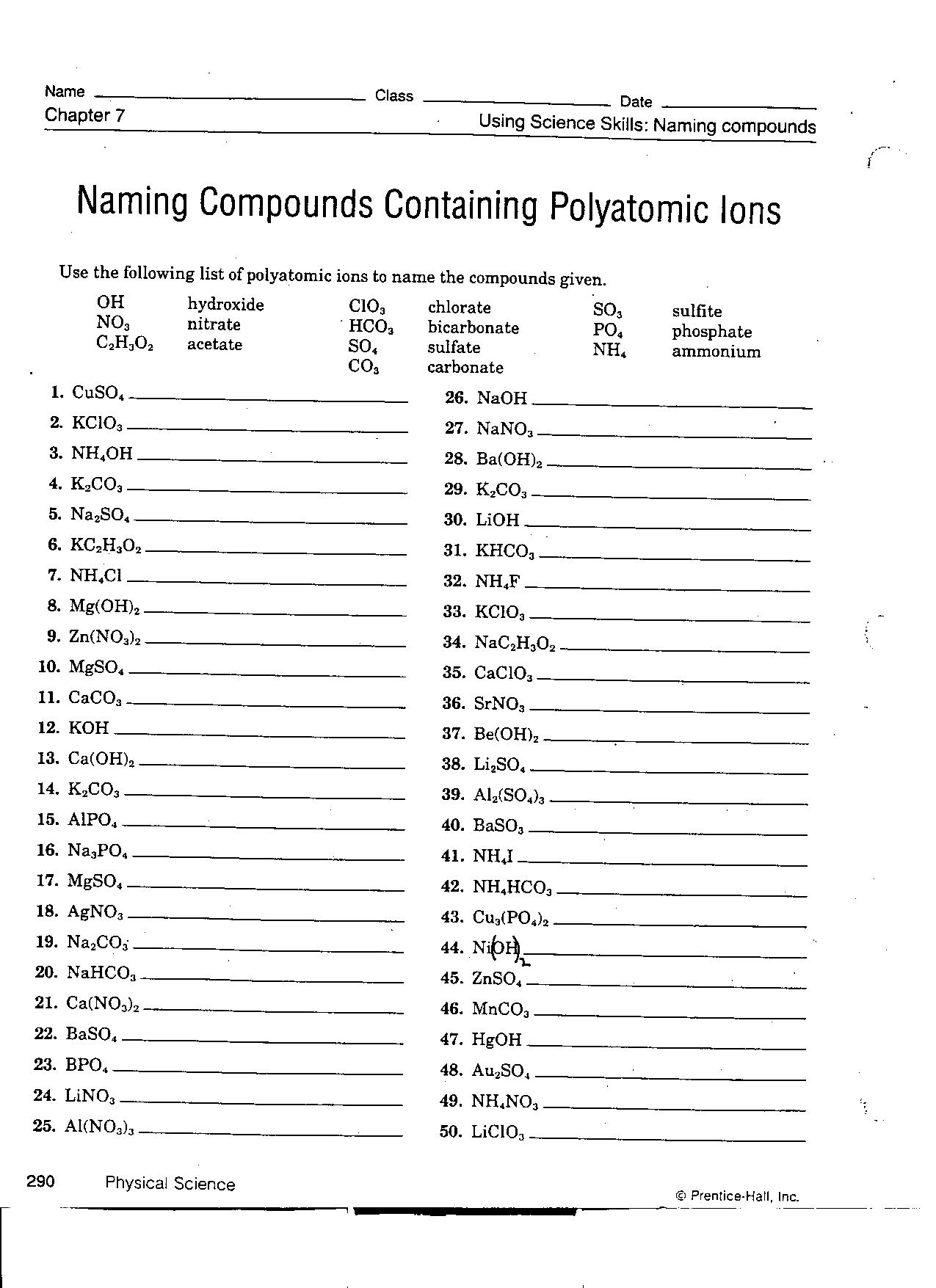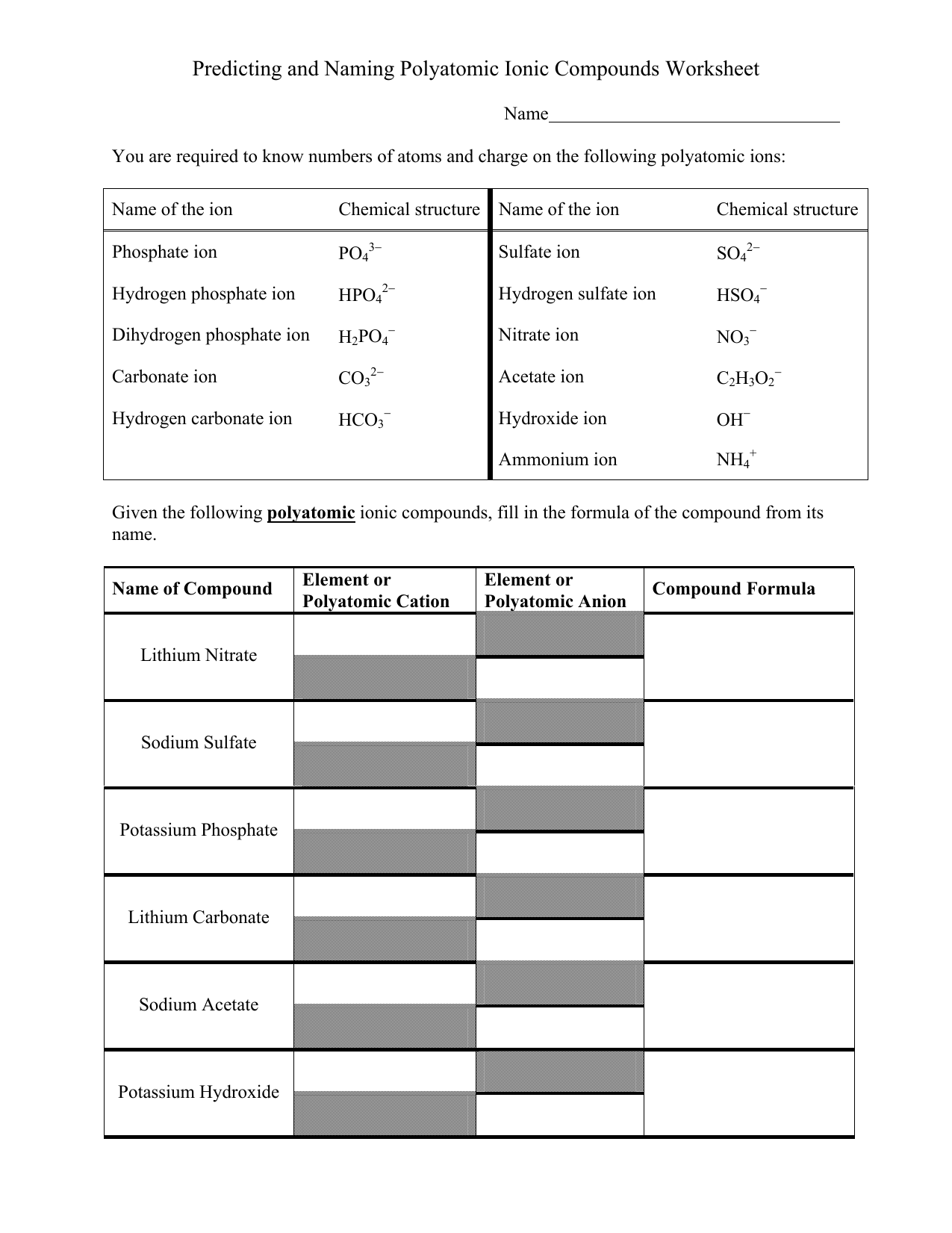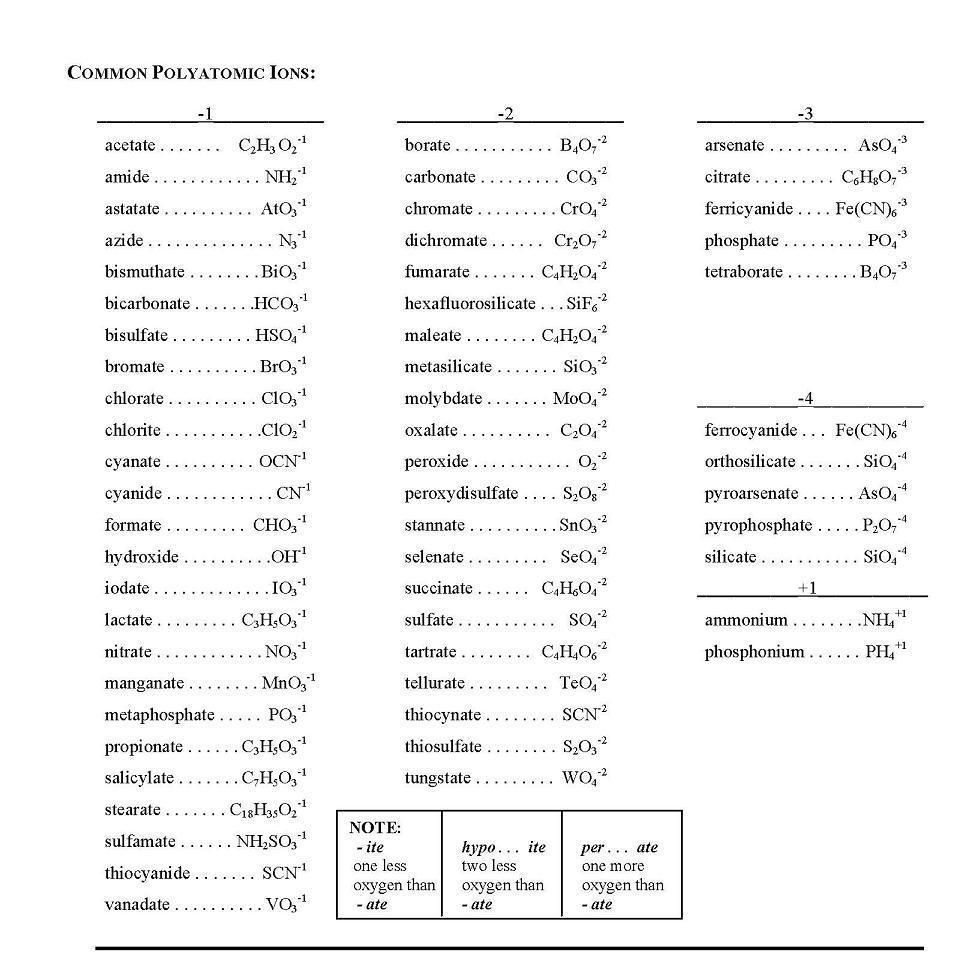Naming Polyatomic Ions Worksheet - Determine whether the following compounds are covalent or ionic and give them their proper names. An example is ammonium ion, nh 4 +. An example is ammonium ion, nh 4 +. It has five atoms (one nitrogen and four. Name or write the formula for the following type ii polyatomic ionic compounds Polyatomic ions are charged groups of atoms. It has five atoms (one nitrogen and four hydrogens) that. Worksheet 5.1 writing and naming ionic compounds with polyatomic ions and transition metals section a write the name of the ionic. Naming ionics with polyatomic ions. Polyatomic ions polyatomic ions are charged groups of atoms.
An example is ammonium ion, nh 4 +. Identify the compound as an ionic compound first [begins with a metal and ends with nonmetal(s)]. Polyatomic ions are charged groups of atoms. Determine whether the following compounds are covalent or ionic and give them their proper names. Worksheet 5.1 writing and naming ionic compounds with polyatomic ions and transition metals section a write the name of the ionic. Polyatomic ions polyatomic ions are charged groups of atoms. It has five atoms (one nitrogen and four hydrogens) that. Naming ionics with polyatomic ions. An example is ammonium ion, nh 4 +. It has five atoms (one nitrogen and four.
Worksheet 5.1 writing and naming ionic compounds with polyatomic ions and transition metals section a write the name of the ionic. An example is ammonium ion, nh 4 +. It has five atoms (one nitrogen and four. An example is ammonium ion, nh 4 +. Polyatomic ions polyatomic ions are charged groups of atoms. Polyatomic ions are charged groups of atoms. Determine whether the following compounds are covalent or ionic and give them their proper names. Identify the compound as an ionic compound first [begins with a metal and ends with nonmetal(s)]. It has five atoms (one nitrogen and four hydrogens) that. Name or write the formula for the following type ii polyatomic ionic compounds
Formulas With Polyatomic Ions Worksheets
An example is ammonium ion, nh 4 +. Naming ionics with polyatomic ions. Polyatomic ions polyatomic ions are charged groups of atoms. Polyatomic ions are charged groups of atoms. It has five atoms (one nitrogen and four hydrogens) that.
Standard Polyatomic Ions Chart Free Download
An example is ammonium ion, nh 4 +. Name or write the formula for the following type ii polyatomic ionic compounds Worksheet 5.1 writing and naming ionic compounds with polyatomic ions and transition metals section a write the name of the ionic. Polyatomic ions polyatomic ions are charged groups of atoms. Identify the compound as an ionic compound first [begins.
Polyatomic Ions List and Worksheet Easy Hard Science
Identify the compound as an ionic compound first [begins with a metal and ends with nonmetal(s)]. Naming ionics with polyatomic ions. It has five atoms (one nitrogen and four. It has five atoms (one nitrogen and four hydrogens) that. An example is ammonium ion, nh 4 +.
Naming With Polyatomic Ions
Name or write the formula for the following type ii polyatomic ionic compounds It has five atoms (one nitrogen and four. It has five atoms (one nitrogen and four hydrogens) that. Determine whether the following compounds are covalent or ionic and give them their proper names. An example is ammonium ion, nh 4 +.
Free Printable Polyatomic Ions Worksheets
An example is ammonium ion, nh 4 +. Name or write the formula for the following type ii polyatomic ionic compounds It has five atoms (one nitrogen and four. Naming ionics with polyatomic ions. Determine whether the following compounds are covalent or ionic and give them their proper names.
Polyatomic Ions List and Worksheet Easy Hard Science
Naming ionics with polyatomic ions. Polyatomic ions polyatomic ions are charged groups of atoms. Polyatomic ions are charged groups of atoms. An example is ammonium ion, nh 4 +. Identify the compound as an ionic compound first [begins with a metal and ends with nonmetal(s)].
Polyatomic Ions Worksheet Answers PDF Worksheets Library
Name or write the formula for the following type ii polyatomic ionic compounds An example is ammonium ion, nh 4 +. An example is ammonium ion, nh 4 +. Polyatomic ions polyatomic ions are charged groups of atoms. It has five atoms (one nitrogen and four hydrogens) that.
Polyatomic Ions Harrisburg Chemistry Presents
Identify the compound as an ionic compound first [begins with a metal and ends with nonmetal(s)]. It has five atoms (one nitrogen and four hydrogens) that. Name or write the formula for the following type ii polyatomic ionic compounds Worksheet 5.1 writing and naming ionic compounds with polyatomic ions and transition metals section a write the name of the ionic..
Polyatomic Ions worksheet
Polyatomic ions polyatomic ions are charged groups of atoms. Polyatomic ions are charged groups of atoms. Identify the compound as an ionic compound first [begins with a metal and ends with nonmetal(s)]. Naming ionics with polyatomic ions. It has five atoms (one nitrogen and four hydrogens) that.
Naming Compounds With Polyatomic Ions Worksheet Pdf
Name or write the formula for the following type ii polyatomic ionic compounds Identify the compound as an ionic compound first [begins with a metal and ends with nonmetal(s)]. An example is ammonium ion, nh 4 +. An example is ammonium ion, nh 4 +. Worksheet 5.1 writing and naming ionic compounds with polyatomic ions and transition metals section a.
Identify The Compound As An Ionic Compound First [Begins With A Metal And Ends With Nonmetal(S)].
It has five atoms (one nitrogen and four. Polyatomic ions are charged groups of atoms. An example is ammonium ion, nh 4 +. It has five atoms (one nitrogen and four hydrogens) that.
Determine Whether The Following Compounds Are Covalent Or Ionic And Give Them Their Proper Names.
Worksheet 5.1 writing and naming ionic compounds with polyatomic ions and transition metals section a write the name of the ionic. Name or write the formula for the following type ii polyatomic ionic compounds An example is ammonium ion, nh 4 +. Polyatomic ions polyatomic ions are charged groups of atoms.









